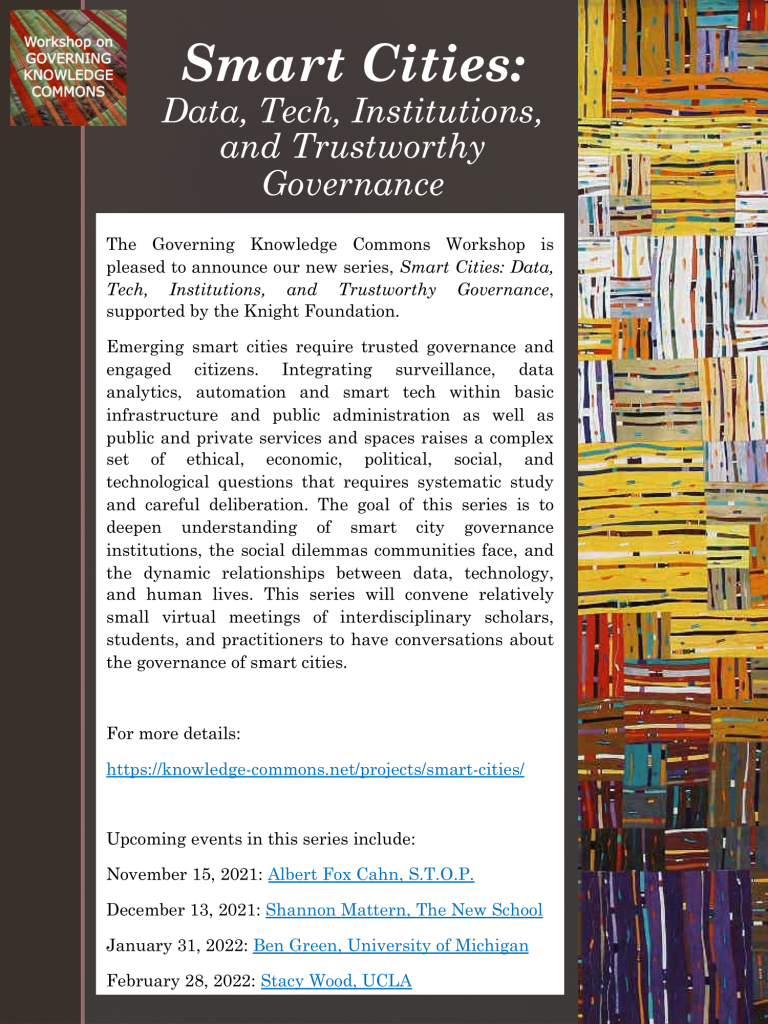This is a home page for events, collaborations, and publications related to studies of “smart city” governance via the Governing Knowledge Commons framework.
Speaker Series
With support from the Knight Foundation
[online; participation is by invitation]
Description: Emerging smart cities require trusted governance and engaged citizens. Integrating surveillance, data analytics, automation and smart tech within basic infrastructure and public administration as well as public and private services and spaces raises a complex set of ethical, economic, political, social, and technological questions that requires systematic study and careful deliberation. The goal of this series is to deepen understanding of smart city governance institutions, the social dilemmas communities face, and the dynamic relationships among data, technology, and human lives.
Speakers
- November 16, 2023 at 12 noon ET: Barry Friedman, New York University, “Controlling Public-Private Surveillance” (paper written with Danielle K. Citron, University of Virginia)
- November 9, 2023 at 1 pm ET: David Gray Widder, Cornell Tech, “Smart Cities, Smart Buildings, and IRBs: The Insufficiency of Ivory Tower Research Governance.”
- October 19, 2023 at 12 noon ET: Daniel Shusset, Villanova University, “The Social Ontology of Smart Cities: Implications and Applications”
- October 5, 2023 at 12 noon ET: Hauke Sandhaus, Cornell Tech, “Towards Prototyping Driverless Vehicle Behaviors, City Design, and Policies Simultaneously”
- June 29, 2023 at 12 noon ET: Anna Artyushina, York University and Alina Wernick, University of Helsinki, “Protecting Human Rights in (Smart) Cities: Governance and Responsible Design of Urban Technologies”
- May 25, 2023 at 4 pm ET: Seth Frey, University of California, Davis, “Scaling Comparative Institutional Analysis With Computational Approaches to Knowledge Commons”
- December 8, 2022 at 2 pm ET: Teresa Scassa, University of Ottawa
- October 27, 2022 at 11 am ET: Fernando Filgueiras, Universidade Federal de Goiás
- September 23, 2022 at 10 am ET: Anna Artyushina, York University
- September 8, 2022 at 2 pm ET: Lara Putnam, University of Pittsburgh
- April 11, 2022 at 4 pm ET: Francine Berman, University of Massachusetts Amherst
- February 28, 2022 at 4 pm ET: Stacy Wood, UCLA
- January 31, 2022 at 4 pm ET: Ben Green, University of Michigan
- December 13, 2021 at 4 pm ET: Shannon Mattern, The New School
- November 15, 2021 at 4 pm ET: Albert Fox Cahn, S.T.O.P.
Publication
Governing Smart Cities as Knowledge Commons (Cambridge University Press, 2023) (Brett M. Frischmann, Michael J. Madison, and Madelyn Rose Sanfilippo, eds.).
Sponsored events
Smart Cities Workshop: Data, Tech, Institutions, and Trustworthy Governance
9-10 October 2020
Online, hosted by the Villanova University Charles Widger School of Law
Philadelphia, Pennsylvania
Description: This Governing Knowledge Commons (GKC) workshop, to be followed by a book collecting case studies focused on Smart Cities and knowledge commons, offers a strategic opportunity to advance knowledge on how cities should respond to the challenges presented by digital networked technologies. Emerging smart cities will require trusted governance and engaged citizens. Integrating surveillance, AI, automation and smart tech within basic infrastructure as well as public and private services and spaces raises a complex set of ethical, economic, political, social, and technological questions that requires systematic study and careful deliberation. Using the GKC framework to structure case studies that examine smart tech deployment and commons governance in different cities serves two fundamental purposes: First, it ignites interdisciplinary social science. Second, it provides important guidance for communities deploying smart tech. The workshop and book will deepen understanding of community governance institutions, the social dilemmas communities face, and the dynamic relationships between data, technology, and human lives.
